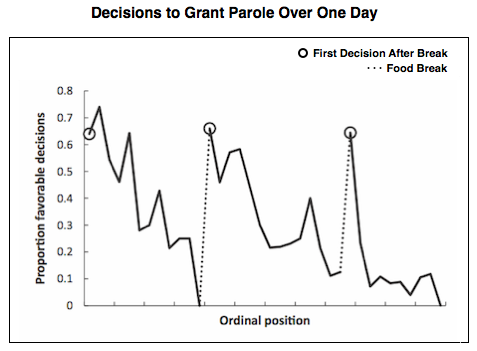

You may have noticed that, when you’re tired, you’re less enthusiastic about making an important decision. Fatigue decreases concentration as well as excitement. Thus, being tired usually means that you’ll make hasty decisions just so that you feel that you’ve dealt with the issue at hand. But hasty decisions are rarely good ones, are they?
While this all seems like common sense, these notions are now supported by actual academic research in the field of decision-making. Even though there have been bits of research on the influence of tiredness on exam performance, creativity, and learning abilities, the latest work deals with workplace decisions with potentially far-reaching consequences.
A team of Israeli scientists decided to study a large set of parole rulings that took place in Israeli courts. Shai Danziger, Jonathan Levav, and Liora Avnim-Pesso observed judges at work as they decided on the fates of convicts who asked for parole reconsideration.
These decisions are typically quite complicated, especially if the ruling judge doesn’t know the case well from previous hearings. The judge must consider the severity of the original deed, the behaviour of the convict while in prison, the potential threats to the plaintiffs and the public, and the likelihood of the convict’s escape.
Because the convicts are staying in a prison at the time of the decision, awarding them parole is also challenging the status quo. Therefore, the reasons to change the existing situation must be even more convincing, and finding them requires plenty of mental strain. To top it all off, there is usually a limited time in which the judge must hear all the parties and make a decision that will determine how the convict will spend the next few months or even years of his or her life.
The research found that, in a vast sample of unrelated cases and across various judges, the occurrence of granting parole decreased significantly as the judges became more fatigued throughout the day. The impact of the judges’ tiredness was so dramatic that the first prisoner of the day had around a 70% chance of being released, whereas the last prisoner before a lunch break had on average less than a 10% chance of receiving a favourable ruling.
According to the research, this can be attributed to the judges’ mental depletion as they made more and more decisions. Remarkably, a lunch break or a coffee break seemed to provide enough refreshment for the judges to make a few favourable rulings before they got “too tired to let go of the prisoners” again.
The marginal implication of these findings is that you should always ask for the first time-slot of a judge if you are asking her or him for a “favour” of this sort. There are, however, more relevant learning points for our day-to-day life.
The complexity of a parole ruling is loosely reminiscent of the decisions many of us must occasionally make. Whether your decision involves spending a lot of money, conceiving a child, or relocating to another house, it is advisable that you always take a short period of quality mental refreshment before you act.
Being relaxed will open up more options and opportunities for you, as you will not be afraid to challenge your own status quo and take up an exciting adventure.
So do not let anyone force you to make an important decision in haste, in the street, or in an impromptu meeting. Your own tiredness can prompt you to take a lead from a salesman, listen to irrational instincts, or fall for a scam or a trap.

Leave a Reply